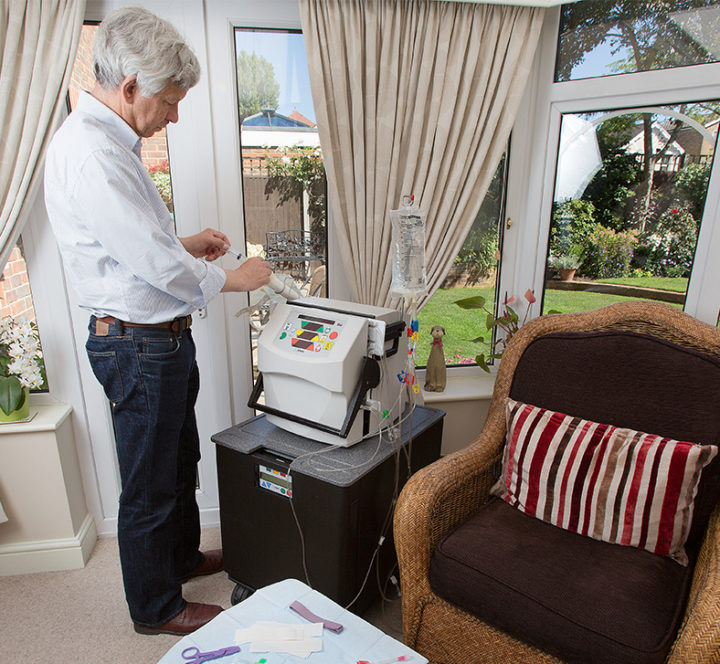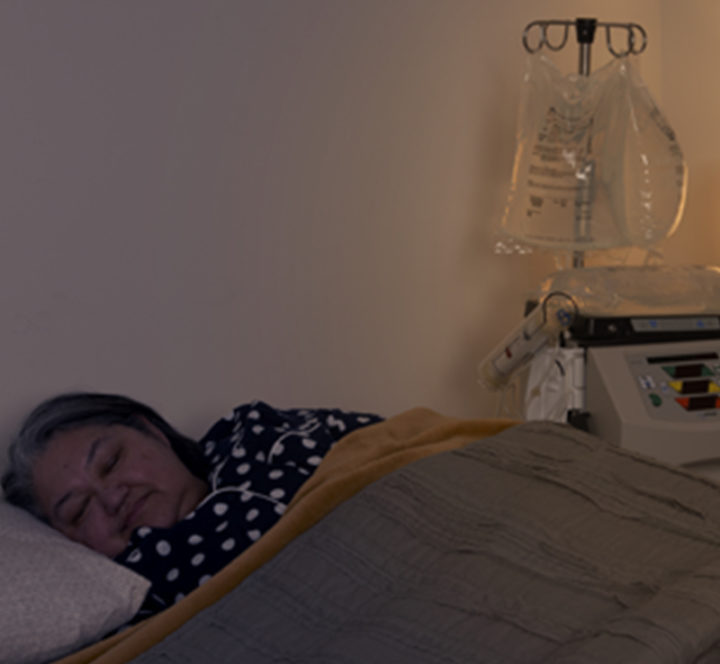When you feel better, you live better. Get your life back. Faster Recovery1, More Energy2, Less Stress on the Heart3.
Designed for home use, NxStage Home Hemodialysis allows patients to perform hemodialysis sessions in the comfort of their own home, allowing for more frequent dialysis, and leading to many health benefits.
- The only system cleared for home nocturnal hemodialysis therapy, allowing for treatment while you sleep
- The compact size allows for easy transport of the machine, enabling our patients to dialyze while on vacation
- Personalized training, and 24/7 NxStage technical support, ensuring you and your care partner are comfortable and confident in your treatment routine
- As with in-center dialysis, your clinic and doctor will work with you on insurance coverage
Learn more about the benefits of NxStage Home Hemodialysis with these free resources.
 Being Me Again DVD (mailed) LIVE: Healthier, Better, Longer PDF (e-mailed)
Being Me Again DVD (mailed) LIVE: Healthier, Better, Longer PDF (e-mailed)Frequently Asked Questions
-
What is the NxStage System One?
Back to TopBack to TopThe NxStage System One is the only truly portable hemodialysis system cleared for home use available in the United States. It is the smallest and lightest commercially-available hemodialysis system today. Its simplicity and compact size are intended to allow easy use in patients’ homes and give patients the opportunity to travel with their therapy. In addition, 90% of Nephrologists (Renal Physicians) said they would choose home dialysis for themselves.
-
What makes NxStage different?
Back to TopBack to TopThe System One is small and portable; it weighs roughly 75 pounds and is just over a foot tall. It was designed for home use by patients and care partners an d plugs into any standard electrical outlet and requires no special electrical connections. It requires no special plumbing modifications; the dialysate preparation system utilizes a simple faucet, under-sink, or washer connection and drains into any sink, toilet, or drain.
-
What are the benefits associated with more frequent hemodialysis?
Back to TopBack to TopMany patients report - and various studies have confirmed — that more frequent home hemodialysis may offer the following health and quality of life benefits:
- More energy and vitality2
- Quicker recovery after treatment1
- Better sleep5
- Fewer fluid and diet restrictions6
- Ability to keep working or go back to work7
- Longer life expectancy8
- More likely to receive a kidney transplant9
- Better blood pressure control with fewer medications10
- Less stress on the heart3
-
What are the benefits of nocturnal therapy?
Back to TopBack to TopHome nocturnal hemodialysis is an important therapy option associated with a number of lifestyle and clinical advantages. By doing therapy while sleeping, the patient frees up their day to pursue other activities therefore reducing the overall burden of therapy. A longer, overnight therapy also allows greatly expanded flexibility in dialysis dose and schedule, better enabling physicians to match the dialysis prescription to individual patient needs.
-
How will I be trained?
Back to TopBack to TopYour dialysis center will train you and your care partner on home hemodialysis therapy. During the training, you and your care partner will learn how to access your blood, operate the NxStage system, monitor your vital signs, administer your prescriptions, and handle emergency situations.
Risks and Responsibilities
Despite the health benefits that more frequent home hemodialysis may provide to those with chronic kidney disease, this form of therapy is not for everyone. Home hemodialysis with the NxStage System One requires a patient and partner who are committed to being trained on and following the guidelines for proper system operation.
The reported benefits of home hemodialysis may not be experienced by all patients.
The NxStage System One is a prescription device and, like all medical devices, involves some risks. The risks associated with hemodialysis treatments in any environment include, but are not limited to, high blood pressure, fluid overload, low blood pressure, heart-related issues, and vascular access complications. The medical devices used in hemodialysis therapies may add additional risks including air entering the bloodstream, and blood loss due to clotting or accidental disconnection of the blood tubing set. Patients should consult with their doctor to understand the risks and responsibilities of home and/or more frequent hemodialysis using the NxStage System One.
Certain risks are unique to the home. Treatments at home are done without the presence of medical personnel and on-site technical support. Patients and their partners must be trained on what to do and how to get medical or technical help if needed.
Certain risks associated with hemodialysis treatment are increased when performing nocturnal therapy due to the length of treatment time and because therapy is performed while the patient and care partner are sleeping. These risks include, but are not limited to, blood access disconnects and blood loss during sleep, blood clotting due to slower blood flow or increased treatment time or both, and delayed response to alarms when waking from sleep. Patients should consult with their physician to understand the risks and responsibilities associated with home nocturnal hemodialysis using the NxStage System One.
References
- Jaber BL, Lee Y, Collins AJ, et al. Effect of daily hemodialysis on depressive symptoms and postdialysis recovery time: interim report from the FREEDOM (Following Rehabilitation, Economics and Everyday-Dialysis Outcome Measurements) Study. Am J Kidney Dis. 2010;56(3):531-539.
- Schiller B, Neitzer A, Doss S. Perceptions about renal replacement therapy among nephrology professionals. Nephrol News Issues. 2010;24(10):36, 38, 40 passim.
- Jefferies et.al. Frequent hemodialysis schedules are associated with reduced levels of dialysis-induced cardiac injury (Myocardial stunning). Clin J Am Soc Neprhol. 2011;6(6):1326-1332.
- Finkelstein FO, Schiller B, Daoui R, et al. At-home short daily hemodialysis improves the long-term health-related quality of life. Kidney Int. 2012;82(5):561-569.
- Jaber BL, Schiller B, Burkart JM, et al. Impact of short daily hemodialysis on restless legs symptoms and sleep disturbances. Clin J Am Soc Nephrol. 2011;6(5):1049-1056.
- Spanner E, Suri R, Heidenheim AP, Lindsay RM. The impact of quotidian hemodialysis on nutrition. Am J Kidney Dis. 2003;42(1 suppl):30-35.
- Kraus MA, Cox CG, Summitt CL, et al. Work and travel in a large Short Daily Hemodialysis (SDHD) program. Abstract presented at American Society of Nephrology Annual Conference, 2007.
- Weinhandl ED, Lie J, Gilbertson DT, Arneson TJ, Collins AJ. Survival in daily home hemodialysis and matched thrice-weekly in-center hemodialysis patients. J Am Soc Nephrol. 2012;23(5):895-904.
- Weinhandl E, Liu J, Gilbertson D, Arneson T, Collins A. Transplant incidence in frequent hemodialysis and matched thrice-weekly hemodialysis patients. Poster presented at National Kidney Foundation Spring Clinical Meeting, 2012.
- FHN Trial Group. In-center hemodialysis six times per week versus three times per week. N Engl J Med. 2010;363(24):2287-2300.







